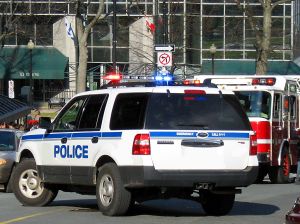Our Boston car accident lawyers know the doctrine of Respondeat Superior may be a valuable tool to help a plaintiff achieve a full and appropriate financial recovery.
 According to a recent story in the Bangor Daily News, in Maine, a man was arrested who had an outstanding warrant from Massachusetts, where he is suspected of being the driver in a hit-and-run car accident in which the victim died.
According to a recent story in the Bangor Daily News, in Maine, a man was arrested who had an outstanding warrant from Massachusetts, where he is suspected of being the driver in a hit-and-run car accident in which the victim died.
Defendant was arrested on a charge of being a fugitive from justice. If a person has a warrant for his or her arrest and gets arrested in a different state, the state in which the arrest occurs will charge the defendant with the crime of being a fugitive from justice. This is not a true crime in the normal sense, but rather is used as a mechanism to legally hold the defendant until the state that issued the warrant can take custody of the defendant. This is what is commonly referred to as the extradition and rendition process.
The defendant can challenge validity of the warrant or agree to let the issuing jurisdiction come and pick him up. Usually, defendant will agree to waive the hearing and allow the state that issued the warrant to come for the prisoner transfer. In the case featured in this article, defendant waived his right to an extradition hearing and allowed the Massachusetts State Police to come and get him, so that he could be returned to the Commonwealth to face charges related to the hit-and-run fatal car accident.
According to reports, the victim was found dead on the side of Route 128 at around nine in the evening. Witnesses reported a dark truck pulling a trailer in the area around the time of the victim’s death. Defendant was supposedly working for a blueberry harvester at the time of the accident, which may explain why he had the trailer.
In a case like this, if the defendant was driving a truck for work at the time of the accident, the victim may be able file a car accident lawsuit against the driver of the vehicle and his employer. In the Commonwealth of Massachusetts, under the legal doctrine of Respondeat Superior, an employer may be liable for negligent conduct of his or her employees. This is significant, because a business typically has more insurance and assets than the driver of a car who caused an accident. This is especially true if the driver of the car is in jail.
The employer will typically try to claim that, even if their employee was on the clock during the time of the accident, the employee was not engaged in an activity that furthered the employer’s business. This is what the law refers to as being on a frolic and detour. If an employee was on a frolic and detour at the time of the negligent conduct, then his or her employer may not liable for the negligent conduct.
If you are injured in an accident in Massachusetts, call Jeffrey Glassman Injury Lawyers for a free and confidential appointment: (617) 777-7777.
Additional Resources:
Louisiana man arrested in Rockland in connection with Massachusetts fatal car crash, August 24, 2014, 2014, Bangor Daily
More Blog Entries:
Why Do Boston Drivers Hit and Run?, July 3, 2014, Boston Car Accident Lawyer Blog
 Boston Car Accident Lawyer Blog
Boston Car Accident Lawyer Blog

